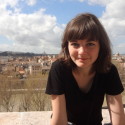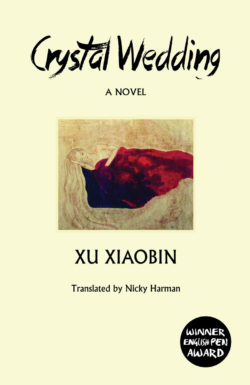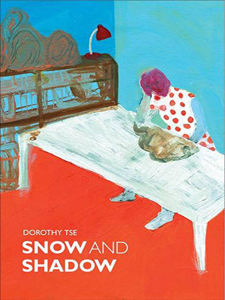Talking Translation: Natascha Bruce
 For the third in our series of interviews with translators, we're delighted to welcome Natascha Bruce, a UK translator currently working in Hong Kong, and joint-winner of our inaugural Bai Meigui translation competition in 2015!
For the third in our series of interviews with translators, we're delighted to welcome Natascha Bruce, a UK translator currently working in Hong Kong, and joint-winner of our inaugural Bai Meigui translation competition in 2015!
Natascha started translating in 2011, working on scripts and subtitles for Taiwanese films, and she has recently moved to Hong Kong. Since winning the Writing Chinese Bai Meigui competition in 2015 for a short story by Dorothy Tse (alongside joint-winner Michael Day), she has worked on short stories by authors including Ye Zhou, Dorothy Tse, Gu Xiang and Xu Xiaobin, for places such as Pathlight, The Bellingham Review, a PEN America chapbook, and Paper Republic.
You can read her winning translation of Dorothy Tse's story in Structo 14, here.
And as part of our April Bookclub we're featuring author Xu Xiaobin 徐小斌 and her story 'Snow', translated by Natascha and Nicky Harman, and published first on Read Paper Republic in March 2016.
What got you started in translation, and what have been some of the biggest rewards and challenges so far?
I studied Chinese for my Bachelor's degree, and focused on contemporary Chinese literature in my final year. A part of that involved translating extracts from texts, and I suppose you could say that this is how I started, in the sense that I discovered I really enjoyed it. Despite my enthusiasm, however, it actually never occurred to me to make the link between literature existing in translation, and there being real people out there creating those translations. I don't know what I would have said I thought happened, if pushed? That once you have studied Chinese for one hundred years and can prove, for certain, that you know everything - will catch every single hidden reference to a Tang poem without missing a beat – there’s a special ceremony and you are given a laptop made of jade and a library of books, and told to go forth and be the person to make them accessible to the English-reading world, something mystical like that.
So I did not think to pursue literary translation. Once I graduated I moved to Taiwan and started translating subtitles and screenplays, instead. This was a lot of fun. I had no idea what I was doing, however, when it came to organising a freelance life. This is a very commonly flagged up challenge, I think, from talking to other translators: it felt entirely miraculous that someone would be offering to pay me to work on their projects, so I didn't feel like I had any grounds to negotiate things like demands for a twenty-four hour turnaround period or, you know, actually paying me. It was also very hard to be freelance in a country where I needed a work visa to set up a bank account - an entirely understandable rule - and I didn't like the criminal feeling that came with getting funds filtered through the bank accounts of more legal friends. So I decided to focus on finding ways to feel less like a criminal for a while, but that meant I had a lot less time to focus on translation. Which was another challenge, because I missed it.
As for rewards, is it too sickly to say that I think the work is kind of its own reward? The process of the work, I mean. The years I spent after Taiwan trying to figure out a way to pin down a steadier, more above-board source of income have convinced me that it's quite rare to have a job you can describe as "a lot of fun." I do think, especially now I've started working on more literature projects – something I credit almost entirely to the competition, by the way! - that it's very rewarding to be able to crawl inside a story and live there, for weeks at a time, and for that to be your job (or one of your jobs, at least). Very daunting, because I do still feel that I need another ninety-three years of studying Chinese before I can really be trusted - but rewarding, all the same.
For our first Bai Meigui translation competition, in 2015, you translated Hong Kong author Dorothy Tse's story, '鸡', a dark and surreal tale. Can you tell us a bit about translating this story?
When a friend emailed me a link to the competition, I was living in Jerusalem and struggling, not particularly valiantly, to get even the tiniest fingerhold on Arabic. I was initially attracted, I think, by the ego-soothing prospect of working with a language I had mastered a bit beyond everyday greetings. But I found Dorothy's writing immediately engaging; it was unlike anything I had read in Chinese before. The story is very surreal, like you say. Very little is explained, although a lot is described, in visceral, unsettling detail: middle-aged women are crammed, screeching, into chicken cages and stacked along the streets of a nameless town, some precocious kid with a pack of cigarettes declares that they've been delivered to replace the mothers that have left, men throng the streets, the town freezes over, the teenage narrator feels a surge of aggression at the sight of his younger sister, naked in a bath tub. I think this is part of why the story is so compelling - you read on because you want to understand how things have come to this, how each detail has led to the next, and then you start again from the top, for exactly the same reason: to try to force an underlying logic into it. This also made it quite intimidating to translate, especially after a bit of a break from translation; I never felt entirely sure I was understanding the language correctly, because the whole point is that reality is skewed, meaning that 'context' wasn't much of a reference point.
We went through the story at the summer school later on, comparing my version and Mike Day's version. This was very interesting and, of course, made me think of the parts I'd change, were I to rework it. I had a long internal debate over the title, for instance, which Mike has as "Chickens" and I had as "Chicken." At the time of translating, I decided that the singular version conveyed both the idea of a chicken as a bird and a chicken as meat, and that this tied in with the objectification of the mothers in the story. I think, though, that this is an example of how, when you're very inside a story, connections can strike you which aren't all that necessary to point out, once you're outside again; I'm not sure the link between the women and the birds needs any more emphasis.
At the other end of the spectrum, there were parts I didn't think too hard about, which struck other people as considered decisions. The precocious kid with the cigarettes is described, if you write it out more or less literally, as "a boy with a scarf wrapped around his head" (一個纏著頭巾,坐在欄杆上的男孩子). Mike had this as "bandanna," a word which never occurred to me, and I had it as "headscarf." The class agreed that "headscarf" made them imagine some kind of Islamic or at least Middle-Eastern connotation, whereas Mike's phrasing conjures more of an edgy, streetwise image. And I realised, once they brought it up, that it was true: the boy I had in mind, when thinking about the sentence, was one of the kids who used to hang around outside the Damascus Gate in Jerusalem, with keffiyehs tied over their heads to keep out the sun. So that, I suppose, was a good lesson in being careful how one's own setting spills over into the setting of the story at hand.
Part of the prize for the translation competition was a bursary to the 'Translate in the City' summer school at City University, London. What was the summer school was like, and how has it helped your career as a translator?
The summer school was great. The literary translation classes I'd taken before, in that last year of being an undergraduate, were quite exam-focused. There was an emphasis on being able to spell out every word and construction in a sentence, which might be valuable as a tool for language consolidation, but does shift attention away from how to make readable prose. The classes at the summer school were the opposite of this, and I found it genuinely revelatory. For the most part, we were working on a chapter from 'Crystal Wedding,' the Xu Xiaobin novel that Nicky Harman - our teacher - was translating at the time. We talked about shifting or adding entire sentences, in order to preserve the narrative logic for English-language readers, and about how it isn't always necessary to translate the time markers that crop up a lot in Chinese, to make up for the lack of verb tenses (this chapter had a lot of paragraphs beginning "thinking back on it now," for example) - and these are both things that, even in the short period since, have come to seem quite obvious, but I was mostly unaware that even this quite mild flexibility was allowed.
The summer school also introduced me to the joys of collective translation. I worried about this part beforehand, because I think slowly and wasn't sure how well I'd respond to translating on the spot. Or, perhaps more to the point, how well I'd respond to incorporating other people's ideas, once I'd settled on a particular phrasing in my own head. As it turned out: just fine, on both counts. We were a little group, only seven people, although with quite a remarkable range of expertise - a native speaker archaeologist who flew all the way from Atlanta to attend; a Chinese literature DPhil candidate who once had a job cold calling Chinese customers and selling them Japanese knives - and I think the dynamic worked very well. Everyone was very happy to spend half an hour debating one sentence. Several things were opened up for discussion that I thought were entirely unremarkable when reading through the text on my own. And, as I should have expected, at those times when we were grasping for an expression or a synonym that seemed just out of reach, having so many minds to throwing words around was much more productive than any of the times I've sat at my desk, scrolling through online thesaurus resources, hoping for the best.
Career-wise, I suppose all this learning was the most important thing. I have also worked since on pieces with Nicky, as well as with Dave Haysom, who made a guest appearance at one of the evening events; I suspect meeting them in person was very helpful, in this respect. There have also been a couple of times when I've been stuck with a few different options for a particular phrase, or a name, and I've emailed classmates to ask their opinion. It's nice to feel we can carry on throwing words around, remotely.
 You and Nicky Harman have translated our April Bookclub story, 'Snow', by Xu Xiaobin. What drew you both to this story, and were there any particular challenges in translating it, and especially working together with another translator?
You and Nicky Harman have translated our April Bookclub story, 'Snow', by Xu Xiaobin. What drew you both to this story, and were there any particular challenges in translating it, and especially working together with another translator?
I enjoyed working on the ‘Crystal Wedding’ extract during the summer school, so that was the entry point, for me. I particularly like translating dialogue, perhaps as a legacy of subtitle translation, and I think the dialogue in ‘Snow’ is very well-paced: there is such tension behind it! I also think Xu Xiaobin has quite a distinctive tone to her writing in general, which makes the translation quite intuitive. This was helpful for our co-translation, because the way we did it was to split the piece roughly in half, each work on one half, and then switch to edit; I imagine we would have struggled more with consistency between the two parts, if the writing style hadn't been quite as defined. So, in terms of working together, I found it to be productive, rather than challenging. There are so many junctures, working alone, when there seem to be about six reasonable alternatives for one half of a sentence - and it's possible to whittle them down to two, perhaps, or canvass nearby English speakers for their opinion on which one sounds best, but it was a great luxury to be able to throw in a comment box and say, to someone equally invested in the piece, who had also read through the Chinese, "I can't hear anymore. What do you think?" It was also an advantage, of course, that Nicky had just finished working on 'Crystal Wedding.' She was very familiar with the writing, and there were even a few points where characters from 'Crystal Wedding' reappeared in 'Snow' - in a couple of instances, characters who had had to be given pseudonyms - and so we could maintain this crossover. In terms of challenges not related to co-translating, however: there are a lot of leaps between time periods in 'Snow.' We were not cutting time markers, here; we were adding them.
Did you work with the author during the translation? Or have you had this experience on other translations?
Nicky had been emailing back and forth with Xu Xiaobin about 'Crystal Wedding,' so the lines of communication were there for questions about 'Snow,' too. We sent her a list of quite specific questions, checking things such as whether this was the Japanese philosopher she meant, or whether we had a particular time shift right. We also co-translated Xu Xiaobin's preface to 'Crystal Wedding' around the same time, and emailed her about that. There is a part in the preface where she talks about working on a farm during the Cultural Revolution, about how at times the only things they had to eat were roots they dug up from under the snow, and then she adds: 喝尿盆里的剩水.So, literally "we drank leftover water from our chamber pots." And I could not figure out whether the implication was that they were collecting, say, leftover rainwater in their chamber pots - but, then again, if it was cold enough to snow, maybe there wouldn't be rain, and maybe any water would simply freeze over? - or whether it was a sort of euphemism, and they were drinking urine. I asked a couple of native speaker friends, who assured me that the Cultural Revolution was awful and, although they couldn't say for sure, it was probably urine. It seemed like quite an important point to clarify, though, either way. We asked Xu Xiaobin and she wrote back to say she was referring to drinking melted snow, which was definitely a relief - both because I'm very glad she never had to drink urine, on top of everything else, and because I'm pleased not to have included such a dramatic statement, only for it to turn out not to be true.
Are there any authors or projects that you're particularly keen to work on? (Or simply authors that you'd love to see in translation?!)
I've just moved to Hong Kong, so at the moment I'm looking forward to reading - and, hopefully, translating - more pieces by Hong Kong writers. To learn more about how Chinese is moulded when it's written down by authors who hear the characters in Cantonese. Over the last few months, I've also been slow-burn translating a short story by a Malaysian writer, He Shufang (賀淑芳), which is a very, very beautiful, intricately-written piece about an alliance between two university professors, and the censorship they encounter in their teaching. Except that summary doesn't do it justice, and neither does the fact I'm working through it at the speed of about an inch of text a month; I would love for this to be an official project, so I could stop feeling compelled to sideline it in favour of other 'official' work.
Are you working on anything at the moment that you can tell us about?
I've just started to work on another story by Dorothy Tse. I can't tell you the title because my translation isn't that advanced just yet, and it's a tricky title, but it's for an anthology of writing from all over Asia, put together by a Singaporean publisher, Math Paper Press. It's longer than 'Chickens,' and less immediately grotesque or surreal. In fact, it lulls you along at the start, with visions of autumn leaves and domesticity, and the arrival of a new family pet. Needless to say, however, those are not the visions it leaves you with. This will be an especially interesting project, I think - to return to the topic of working with authors - because Dorothy is based in Hong Kong and speaks fantastic English, so she'll be able to give me her feedback on my drafts in a way that isn't usually possible.
Thank you so much, Natascha!

